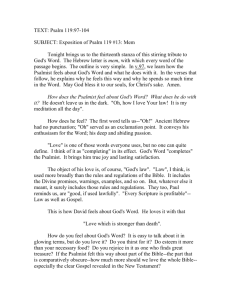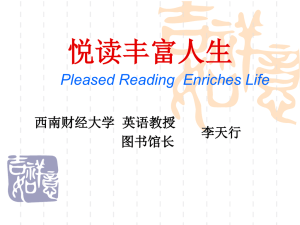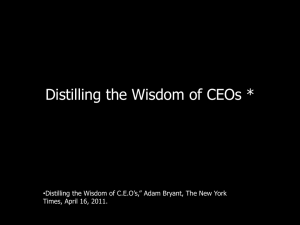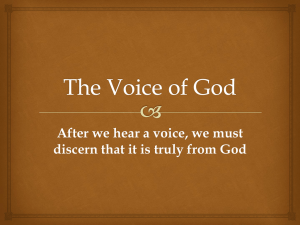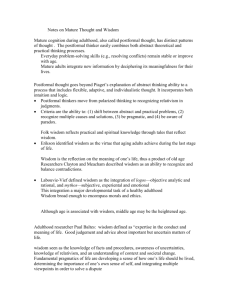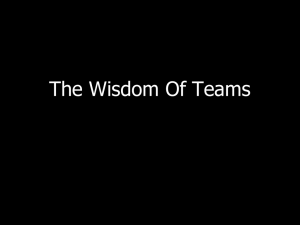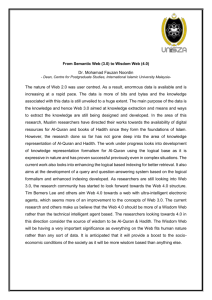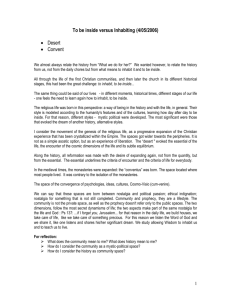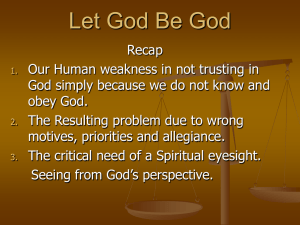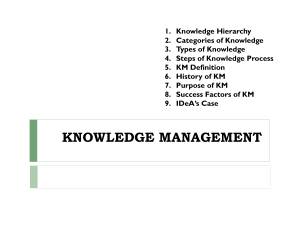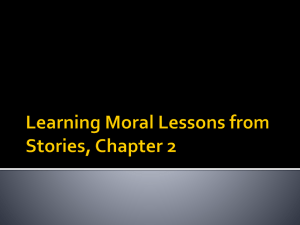Truth and Wisdom
advertisement
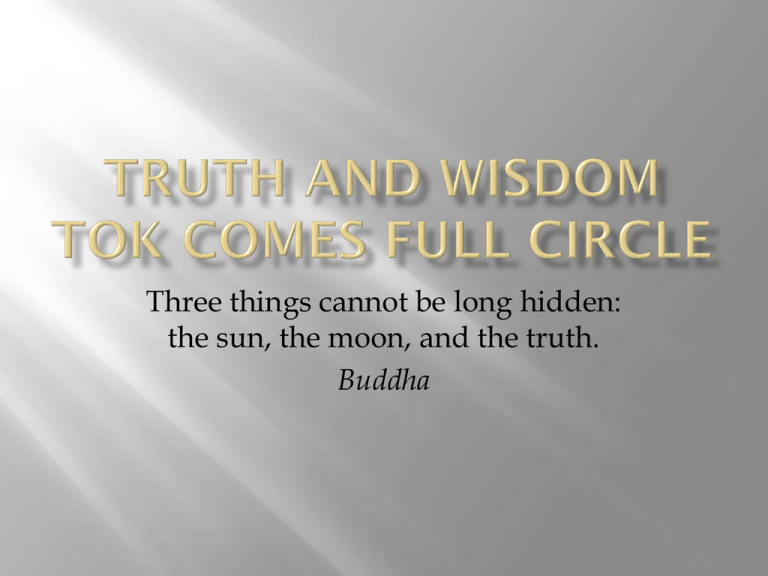
Three things cannot be long hidden: the sun, the moon, and the truth. Buddha Correspondence theory of truth: a statement is true if it corresponds to a common sense fact. Live grass is green. What does it mean for a fact to exist? Imperfection: there is a gap between the world as it exists and the language we use to describe it. Descriptions in human language are imperfect. Paradox of Cartography: there is no perfect map. Our senses are fallible. Our emotions are easily swayed. Confirmation bias, positive self bias. Coherence: it’s true if it fits into our understanding of the world. There are sharks in the pacific ocean. Coherence is good for a confirmation of truth, but is not good for a stand-alone truth test. Coherence cannot dispute or exclude ‘crazy’ individual beliefs. Aliens landed spaceships in my backyard last summer. I saw it. They reprogrammed my dog. Beware: not believing anything that doesn’t fit in with the way you see things. I don’t believe there is a God, so the idea of ritual worshipping on Sundays is a waste of time. Anyone who does it is dumb, too. Pragmatic theory: true if it is useful and/or works in practice. Scissors cut paper. Therefore, when I needed to cut paper, I found a pair of scissors. A statement can be true but not useful, and useful but not true. I am a genuis! (Useful in my self confidence, but not true…or is it?) Jennifer Anniston got her hair cut. (True, but not useful. At all.) The terms “useful” and “works in practice” are too vague. Circular reasoning. Cubist theory: The more perspectives you have of something, the closer to the truth you can get. Go beyond “I am right and you are wrong” in regards to truth; but rather ask: How does this person’s perspective and understanding illuminate my understanding? Ms. Frizzell, looking for Truth. Is seeking the truth natural for human beings? Recall: Plato’s Allegory of the Cave. Do we need others to start us on the quest for truth, to be our guides once we leave the cave? If we didn’t seek the sunlight (knowledge) would we remain contentedly chained to the wall watching shadows of images? Our version of the world and of ‘truth’ is always based on an interpretation, and we can never be sure if that interpretation is true. Question: What goes into our varied interpretations of the world? Many people believe what they want to believe rather than what is justified by evidence. Comfort trumps the work necessary to change your way of thinking; illusions are better than harsh, unsettling truths. Defense Mechanisms: Selective attention—see only what you want to see. Rationalization—manufacture bad reasoning to justify prejudices. Communal Reinforcement—mixing exclusively with people who hold similar beliefs. Can you think of REAL LIFE EXAMPLES of all these? Our knowledge tools are limited: Perception We all experience reality differently. Language Aspects of reality lie beyond our attempts and abilities to describe them. Reason There are concepts we cannot possibly understand that are beyond our conception comprehension, but that are also logical and reasonable. Emotion Believing something passionately does not make it true. If we are successful in our quest for knowledge, does that mean that we are closer to truth? If we believe we possess the truth, we run the risk of being dogmatists (force our beliefs on others). HUMILITY is needed in the search for truth. Agree or Disagree: the truth is ‘out there’ independent of our acknowledgement or discover of it. Relativism: saying that we can never know absolute truth does not mean that no truth exists. “There is not truth” is self-refuting. Beware: prejudice, persuasion, power, propaganda. Think of the truth as an ideal that guides our quest for knowledge. There is a difference between the possession of knowledge and what you do with it. Where is the wisdom we have lost in knowledge? Where is the knowledge we have lost in information? Humility: comes from practice, listening, and open mindedness. Good judgment: comes mostly from experience. Breadth of vision: comes from exploring a multitude of knowledge areas, a variety of perspectives, varied sources, and flexibility of understanding. Self-Knowledge: Know thyself. Question your beliefs regulary and be aware of underlying prejudices—they are good at being invisible to us. Knowledge and values Trust and doubt If knowledge and the sharing of knowledge is based on trust, we owe a lot of integrity to the claims we make. Honesty, perseverance, courage, tolerance, and a willingness to listen when our ideas are criticized. Never place yourself above others; it is the best way to stop the flow of knowledge from individual to collective. Every answer should breed new questions; always. Learn your ignorance: acknowledge your deficits. “All I know is that I know nothing.” –Socrates Plato argued that the only truths are “justified true beliefs.” Now that the ToK class is nearing the end, what do you understand this to mean? Must we be at the end of our lives or in old age to be wise? Why is the metaphorical wise man always an old guy? Why not a young woman? Do you think we are getting closer to truth? If so, to what do we owe this progress? If not, what most hinders us? Can you think of a time in History when dogmatists skewed the collective search for truth? How are truth and wisdom different? How are they similar? What are the strengths/limitations of each? Come up with a visual metaphor to represent truth and/or wisdom. Draw it in your comp book. Does relativism encourage tolerance? Are there dangers in seeking the truth? Think of the areas of knowledge—what happens when we go too far in our quest for truth in the various areas of knowledge? What films, novels, poems, other works of art warn us of the dangers of pursuing the truth? (Frankenstein, Adam and Eve, ??) This sheet should look familiar. As a ToK graduate, fill it out again. Be thoughtful and reflective! When you are finished, take a look at the one you filled out last January. Compare your answers. What has changed? What has stayed the same? What are the causes of the changed and static items? “If today were the last day of my life…” Steve Jobs clip (2 min) Jellybeans for every day of your life… (3 min) Do we need to be at the end of our lives, or be faced with our own mortality, to appreciate time, to seek wisdom, truth, and knowledge? Is it possible to live every day as though it is your last day? What “words of wisdom” do you tend to live by? *Write them on the board. Create a WALL OF WISDOM as a class…continue to add to it. If you know the source, include it. “Our Loss of Wisdom” (TedTalk) Barry Schwartz What questions does he attempt to answer in his talk? Do the problems he points out affect you or your generation? How so? What possible solutions do you have to offer? Who do we consider “great minds” in history? Think about all areas of knowledge!) Who are the “great minds” of your generation? Are these people smart, or wise, or both? With a partner, create a “help wanted ad” for the job of Wise-Person. Due tomorrow. You can imagine after our discussions of history that the recording of wisdom of marginalized people has not been voluminous. Malala Yousafzai’s UN Speech Is Malala wise or does she simply have an experience most of us do not? Does she share any nuggets of wisdom that you believe are important for young people? 200 years ago, what would the perception of this woman be? Who are some other people we consider “wise” who, 200 years ago, would not have been recognized was wise? Who would have, or did, suffer for attempting to share their wisdom? Temple Grandin: The world needs all kinds of minds. (TedTalk) Michelle Obama: A plea for Education What problems is your generation faced with solving? How will knowledge, truth, and wisdom be used to solve these problems? What advice do you have to your generation in order to approach problems in the most productive way? What advice has your generation gotten that you find useful? Not useful? Can education be reformed to instill wisdom in students? 1) 2) Think about the ways/areas of knowing— what does “pursuing truth” mean in each of the areas/ways? Break into pairs and pick one area of knowledge. Please do not double up…each pair should have a different AoK. Where do we, as a society and as individuals, draw the lines or impose limitations on the search for truth in this area? Why are these lines drawn? 3) Share out your findings from your discussion with the rest of the class. Engage them in conversation about what you talked about in your pairs. What are some common themes? (This may take 2 days) *Please turn in your textbook!!

